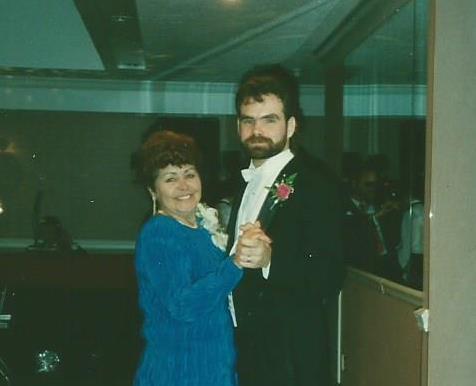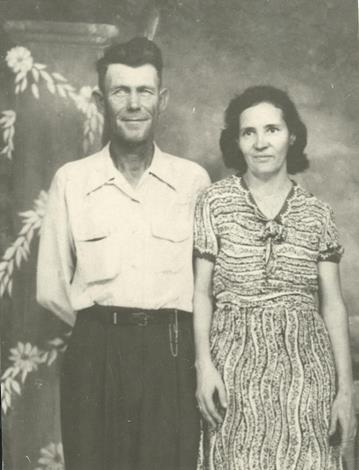
My mom and I dancing at my second wedding. 1990
Today is the 10th anniversary of my mom’s death. I’ve been planning to write something about her for quite a while now, but I had to scrap every attempt because they were all too long – a reminder that there’s no easy way to tell her story. There’s no short version. I’m going to try one more time to be concise and get in the essential details in a reasonably sized article.
My mom grew up in a John Steinbeck novel. She was the fourth of five children born to sharecroppers in southern Missouri. She was raised in a home dominated by extreme poverty, the alcoholism of her father, and the religious fanaticism of her mother. And like so many children growing up in chaotic, dysfunctional homes, she learned it was safer to keep her thoughts and feelings to herself. Her best defense was to escape, not in alcohol or food, but in books. My mom found her solace in the printed word.

The Joads of East Prairie. Burt and Lois Cooper.
According to her oldest sister Suzie, she read every book on the public library book mobile and still hungered for more. Through her reading, my mom developed a love for the history and lore of the American South. She loved Gone With The Wind, but I don’t think it was the soap opera that attracted her. Instead, I think she identified with Scarlett O’Hara’s vow to never be poor again. I know she later loved To Kill A Mockingbird, and I often wonder if she loved William Faulkner and Flannery O’Connor, two authors I discovered later in life. I’m sure she did, we just never got around to discussing them.
Eventually my mom moved to the big city, got a menial office job downtown and learned to live on a can of chili a day. She tried to shed her identity as a poor farm girl. She made some friends and dated a little. Then she met my father, a dashing, energetic young man with a troubled past. Like her, he had a strong desire to rise above the constricting circumstances of his family.
It’s hard to imagine now what my mom’s reaction must have been to the band of gypsies, gangsters, and armed robbers that were my father’s family. They made it clear to her early on that, if she wanted to join the Krysl-Radosavich clan, she would have to do two things: become Catholic and learn to play poker. She did both. And despite her often crippling social fears, my mom held her own. She didn’t suffer fools lightly and they respected her for it. She became a good poker player, too. By the time the casinos began popping up all over the Midwest, my mom’s luck was legendary amongst her family and friends. She loved to gamble and never got in trouble with it because she usually won.

The Mod Squad. My father (left), my mother, and my dad’s best friend Jim Staggs.
She also learned another skill from my father’s family. To seem more urban and sophisticated, she learned to smoke cigarettes from my dad’s brother Ray. She had no way of knowing back then that she was starting a habit that would eventually take her life.
My parents married in 1956. As my father’s career in the grocery business began to take off, my mom eventually stopped working to focus on raising a family. In 1960 she gave birth to a son whom my parents named Frank. He was Frank Krysl the Fourth. Tragically, he was born with spinal bifida and only lived a few days. This was a loss my mom rarely talked about. My father was more open about it with me, but my mom, as she did with so many of the losses in her life, kept her feelings to herself. I honestly think that when she had a child who survived, she was so relieved that she chose to avoid the risk of trying to have any more children.
Being an only child was a mixed blessing for me — on the one hand I never had to compete for attention, I always had my own bedroom and my own possessions, and yet I always envied my friends who had siblings. I fantasized about being able to use the phrases “my brother” and “my sister” in sentences.
Growing up I was my mom’s friend and confidant. While my father was her equal in every way, his intelligence differed from my mom’s. He was more like Zorba The Greek – lusty, passionate, and generous to a fault. His wisdom came from a Mediterranean sense of giving and hospitality. I was more like my mom, I loved the details. I loved books. I loved movies and television, musicals and comedy. I was the only straight kid in South St. Louis who knew the difference between Leonard Bernstein and Elmer Bernstein. I knew the names of all five Marx brothers and I could name the hosts of the Tonight Show, in order, including the years they hosted the show. All thanks to my mom.
When I read a biography of Jim Morrison in 1980 I encountered the name of Friedrich Nietzsche for the first time, the mighty German philosopher who was one of Morrison’s heroes. I asked my mom if she had ever heard of him. She had, and she taught me the correct way to pronounce his name.
We influenced each other musically. Through me she learned to love Led Zeppelin and The Doors, and through her I learned to love Neil Diamond and Simon and Garfunkel. In fact, my favorite memories of my mom were of Saturday afternoons spent cleaning the house. I was expected to help her out to earn an allowance. To pass the time she would put on S&G’s Greatest Hits and sing along in her goofy, slightly ironic way to Kathy’s Song and Homeward Bound.
We disagreed about music, too. She never understood why I loved Black Sabbath and I never forgave her for loving Bob Seger.
While my mom was sometimes hard to know and could be unpredictable with her anger, she was above all, fun to be around. My friends loved her, my father loved her, and my daughter loved her.
Toward the end of her life my mom suffered a series of tragedies that took an enormous toll on her. Unfortunately, I believe they helped to hasten her end. She lost two of her sisters with whom she was very close. Both within a few years of each other. One died of lung cancer and the other was killed by a drunk driver on a remote highway near Fredericktown, MO.
Most cruelly of all, her brother Luke, who suffered from a debilitating fear of the medical system, chose to take his own life rather than seek medical treatment for an illness which was never diagnosed. At that time, my mom and her brother took turns caring for my grandmother, who suffered from Alzheimer’s. They each took shifts at my grandmother’s house. Luke had been sick for a while and my mother was very worried about him. On the last day of his life, he waited until my mom arrived, finished a cup of coffee, then went into the backyard and shot himself in the chest with a 12-gage shotgun.
That experience was a trauma from which she never recovered. Within two years she was diagnosed with lung cancer. My father fought valiantly to save her, but I honestly think my mom was ready to leave this life. Of course, I’m not certain of that, it’s more of an intuition than anything.
While my mom’s end was terribly sad, she lived a very happy life. She left a wake of joy and happiness with her humor and her kindness.
When my father asked me to deliver her eulogy, I was intimidated at first. How to sum up a life such as hers? Especially to a room full of people who knew her so well? I ended up telling many of the stories I’ve told here. I also added this passage from Thich Nhat Hanh, a Vietnamese Zen Buddhist who has always been an inspiration to me. In this passage he talks about the death of his own mother, and his reaction to speaking with her one night in a dream:
When I woke up my mind was at peace. I realized that my mother’s birth and death were concepts, not truth. The reality of my mother was beyond birth or death. She did not exist because of birth, nor cease to exist because of death. I saw the being and nonbeing are not separate. Being can exist only in relation to nonbeing, and nonbeing can exist only in relation to being. Nothing can cease to be. Something cannot arise from nothing. This is not philosophy. I am only speaking the truth.
That passage helped me to deal with the loss. It still does today. Nonetheless, my experience has been that the most acute feelings of loss come when I least expect them. There are moments when I want to talk to her in a way that’s purely detached from reason. The urge comes before I have a chance to remind myself of the hard fact that she is no longer in this life. It’s as though a more primitive part of my brain takes over. It assumes that we’ve just gone an extra long time without speaking to each other. I wanted to call her when Barrack Obama was elected. I wanted to tell her how fabulous her beloved granddaughter’s wedding was. I wanted to tell her how great Paul Simon was in concert.
Maybe the saddest thing of all is that she never once heard the name of her great-grandson. She would have smiled appreciatively, as I have, at what an outrageous and wonderful name Dominik Corno is. She would have marveled, too, at how well his personality fits his name.